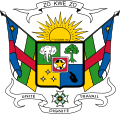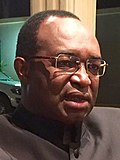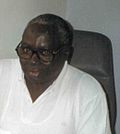| Prime Minister of the Central African Republic | |
|---|---|
| Premier Ministre de la République Centrafricaine (French) | |
 | |
| Member of | Council of Ministers |
| Seat | Bangui |
| Appointer | President of the Central African Republic |
| Term length | at the pleasure of the president |
| Formation | 13 August 1960 |
| First holder | David Dacko |
 |
|---|
There have been twenty-five heads of government of the Central African Republic and the Central African Empire. The office of prime minister, the head of government, was created when the Central African Republic became an autonomous territory of France in December 1958. It was originally the highest post of the Central African Republic, though France did maintain a governor in the territory. After the Central African Republic declared its independence on 13 August 1960, David Dacko held both the prime minister and newly created president of the Central African Republic posts briefly before eliminating the prime minister position and placing all executive power in the office of the President.
Contents
President Jean-Bédel Bokassa restored the office of prime minister to assist him in governing the country in 1975, shortly before he declared himself emperor. He selected as prime minister Elisabeth Domitien, who become Africa's first female head of government. After Domitien was removed from office, Bokassa named Ange-Félix Patassé to become his next prime minister. Patassé continued serving as prime minister after Bokassa declared the establishment of the Central African Empire in December 1976. Henri Maïdou succeeded Patassé and continued serving as prime minister after Bokassa was overthrown from power. During the following two years of Dacko's presidency, three more politicians served as prime minister. The post was abolished when Dacko was overthrown from the presidency by Andre Kolingba on 1 September 1981. The position, as it exists today, was recreated in 1991, when President Kolingba was forced to relinquish some of the executive power. The president has the authority to name the prime minister and can remove them from office at any time. The prime minister is the head of the government; within days of being appointed, they must select individuals for their Cabinet, who they will work with to coordinate the government.
The current prime minister of the Central African Republic is Félix Moloua, since 7 February 2022. [1]





















